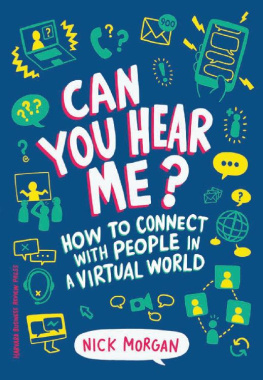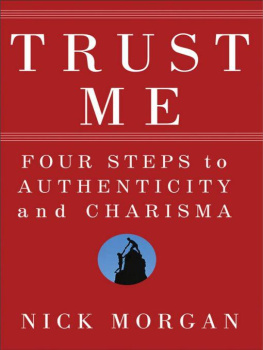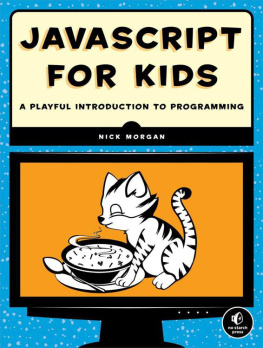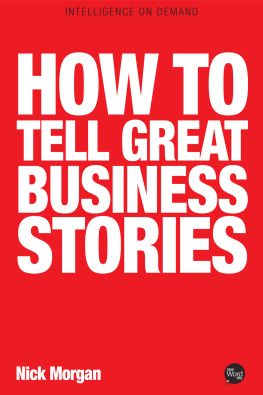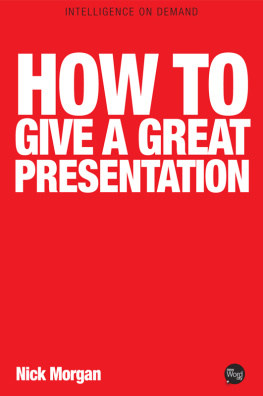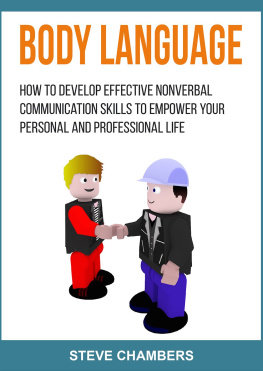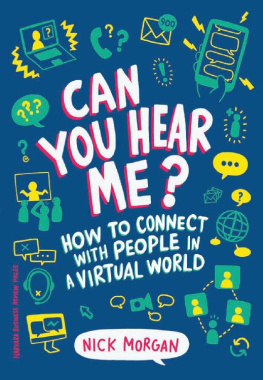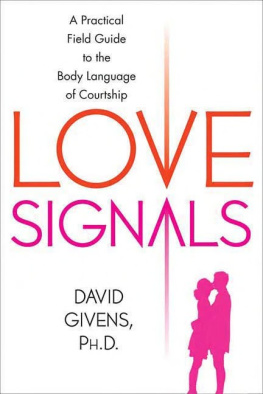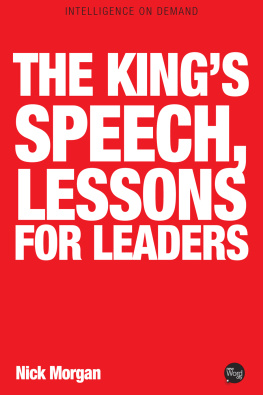PRAISE FOR POWER CUES
Nick Morgan's ideas in Power Cues aren't just talk. They're the depth and pulse of what's missing when you ask why you're not more successful. This is your chance to fix that.
Chris Brogan, CEO and Publisher, Owner magazine
There are few skills more important in the twenty-first century than communicating with persuasion. Nick Morgan is a true master of this craft, with advice and insight honed in decades as a speaking coach. Read this engaging book and watch your impact soar.
Pamela Slim, best-selling author, Body of Work
I have to study body language every day when I negotiate with customers. Power Cues is the book I wish I'd had twenty years agoI would have won a lot more negotiations and made a lot more money!
Les Gold, star of truTV's Hardcore Pawn; New York Times best-selling author, For What It's Worth
Finally, a book that defines the importance of how the human form communicates. Morgan has researched how humans interact and provides practical, scientifically proven tips for communicating confidently with influence. Bravo!
Nancy Duarte, CEO, Duarte, Inc.; author, HBR Guide to Persuasive Presentations
This is one of the most important books you will ever read. Not just this yearever. There's an old saying that words account for only 7 percent of your communication. Power Cues covers the other 93 percent (and even some of the 7 percent). My hope is that everybody in the workforce today will read this book. More important, I wish that every student would be forced to read this bookor take a class with Nick Morgan.
Mitch Joel, President, Twist Image; author, Six Pixels of Separation and Ctrl Alt Delete
Wow! I wish I'd had this book ten years ago. Nick Morgan is a masterful communicator and teacher, and he has written another must-have book for anyone serious about greatly improving their interpersonal communication and leadership skills. A very helpful, informative, and engaging readperfect for businesspeople, students, teachers, and beyond.
Garr Reynolds, author, Presentation Zen and The Naked Presenter
POWER CUES
The Subtle Science of Leading Groups,
Persuading Others, and
Maximizing Your Personal Impact
NICK MORGAN
HARVARD BUSINESS REVIEW PRESS
BOSTON, MASSACHUSETTS
Copyright 2014 Nicholas H. Morgan
All rights reserved
Printed in the United States of America
10 9 8 7 6 5 4 3 2 1
No part of this publication may be reproduced, stored in or introduced into a retrieval system, or transmitted, in any form, or by any means (electronic, mechanical, photocopying, recording, or otherwise), without the prior permission of the publisher. Requests for permission should be directed to , or mailed to Permissions, Harvard Business School Publishing, 60 Harvard Way, Boston, Massachusetts 02163.
The web addresses referenced in this book were live and correct at the time of the book's publication but may be subject to change.
Library of Congress Cataloging-in-Publication Data
Morgan, Nick.
Power cues : the subtle science of leading groups, persuading others, and maximizing your personal impact / Nick Morgan.
pages cm
ISBN 978-1-4221-9350-1 (alk. paper)
1. Communication in management. 2. Interpersonal communication.
3. Influence (Psychology) 4. Leadership. 1. Title.
HD30.3.M665 2014
658.45dc23
2013050170
The paper used in this publication meets the requirements of the American National Standard for Permanence of Paper for Publications and Documents in Libraries and Archives Z39.48-1992.
ISBN: 9781422193501
eISBN: 9781422193600
i Nikki
Tri chynnig i Gymro
CONTENTS
INTRODUCTION
The Invisible Force That Rules Human Interaction
The Dalai Lama, My Father, and My Early Death
Three things happened to me when I was seventeen that turned out to have a significant effect on my interest in communications and, specifically, nonverbal communications, later in life. First, I read a book about the Dalai Lama and made him one of my personal heroes. Second, I learned my father was gay. And third, I died.
Let me take those in order. I read a book about the Dalai Lamas escape into India from the Communists in 1959 and immediately cast him as one of my heroes in a pantheon that included Martin Luther King Jr., President John F. Kennedy, and the Beatles. I was excited, therefore, a half-dozen or so years later when I had the chance to hear the Dalai Lama speak at the University of Virginia, where I was a graduate student, and cheerfully queued up for a seat in the small auditorium.
The room was overflowing with devotees, local Buddhists, and the merely curious. There was an excited, impatient buzzor at least as impatient as Buddhists getand the Dalai Lama was late. He was an hour late when he finally took the stage, crossing to the middle of the space slowly, hunched over a little, dressed in his signature saffron robes, much smaller than Id imagined.
I realized I was holding my breath as he crossed the stage. To my astonishment, when he finally reached the center of the space, he sat on the floor, bypassing the comfortable chair that had been provided. He arranged his robes. He looked at us.
Then he said nothing. He just looked at us for one minute, saying nothing. Two minutes went by, and he was silent. Three minutes passed, and still His Holiness said nothing.
We were transfixed. Finally, he let out an unearthly laugh, high and spacey, like a childs hahahahahahaha. He said, Id better say something really important, Ive kept you waiting for so long.
After that, his speech was an anticlimax. There was something about the way he looked at us in silence, each person in turn, for those three minutes, that made a much deeper impression on everyone in the room than anything he could have said about the science of happiness.
Comparing notes afterward with other attendees, I learned that we all shared the feeling that he had touched us in some profound way. I wanted to know: What was it that passed between us? What was it about the Dalai Lamas silent gaze that was so profound?
More broadly, how did nonverbal communication work? How could one person transfix me with a look?
A Look That Changed Two People Forever
A look also forever changed my relationship with my father. And it took place in a nanosecond on Christmas day.
Id rushed around attempting to buy him a present with my usual lack of success. He was a hard man to buy presents for; he didnt have many hobbies and divided his life rigorously between work and home. When he was at home, he did DIY projects or played the piano. But he wasnt the kind of man youd buy a hammer for; his deep interests were artistic and literary. I couldnt afford to buy him a second piano, so I was looking for a book.


